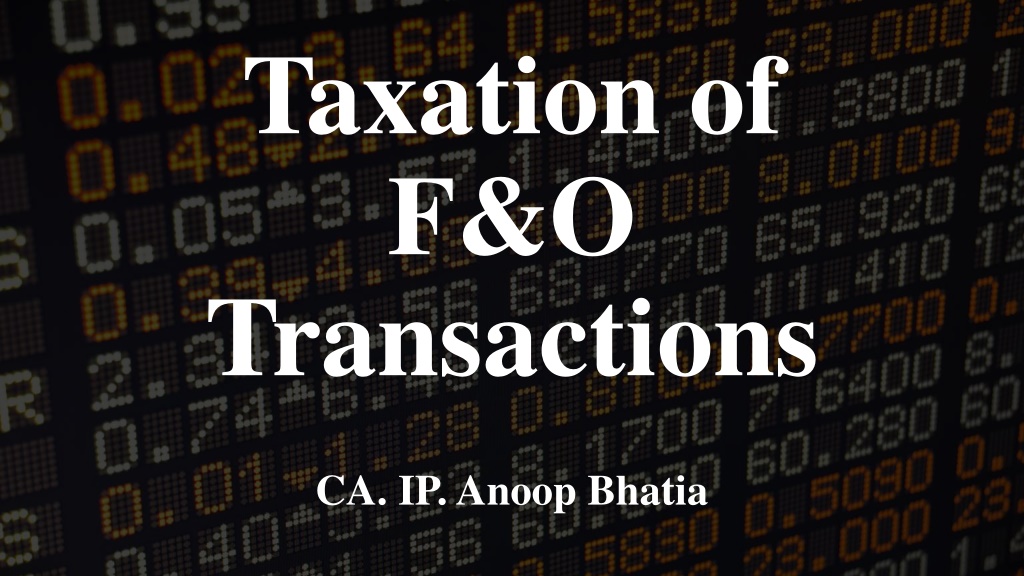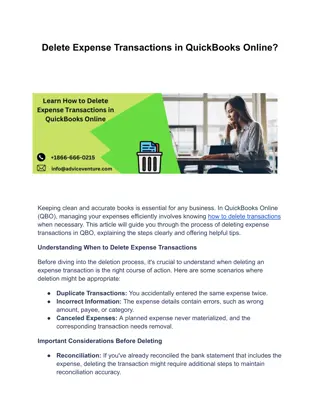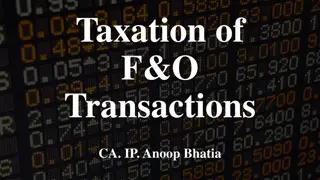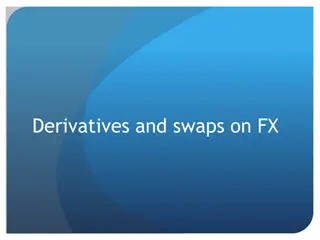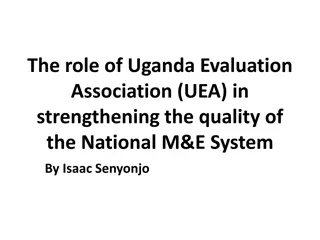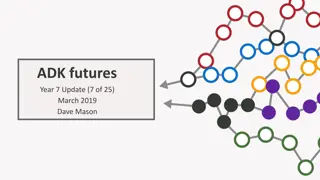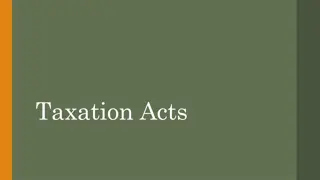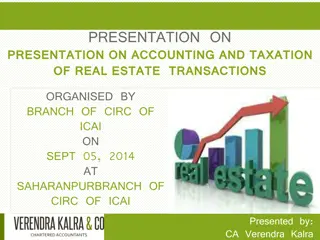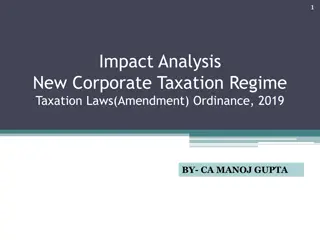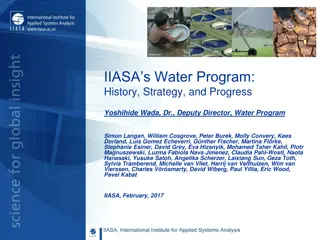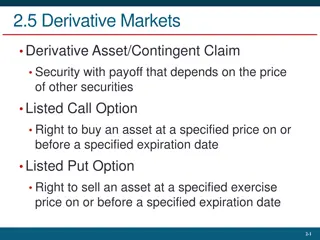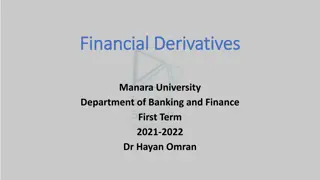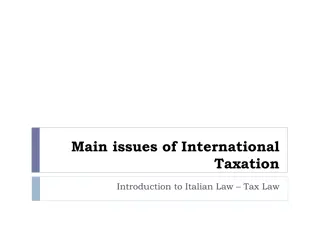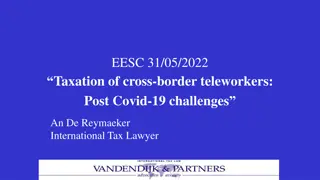Understanding Taxation and Reporting of Futures and Options (F&O) Transactions
Explore the taxation aspects and reporting requirements related to Futures and Options (F&O) transactions. Learn about the types of F&O transactions, relevant heads of income for reporting income/loss, and the provisions of Section 43(5) of the Income Tax Act, 1961, defining speculative transactions. Discover if F&O transactions are eligible under Section 44AD for computing profits.
Download Presentation

Please find below an Image/Link to download the presentation.
The content on the website is provided AS IS for your information and personal use only. It may not be sold, licensed, or shared on other websites without obtaining consent from the author. Download presentation by click this link. If you encounter any issues during the download, it is possible that the publisher has removed the file from their server.
E N D
Presentation Transcript
Taxation of F&O Transactions CA. IP. Anoop Bhatia
Types of F&O Transactions: Futures Options
Relevant Head of Income in which income / loss should be reported : Capital Gain Speculative Business Normal Business Other source income
Section 43(5) of the Income Tax Act 1961 (5) "speculative transaction" means a transaction in which a contract for the purchase or sale of any commodity, including stocks and shares, is periodically or ultimately settled otherwise than by the actual delivery or transfer of the commodity or scrips: Provided that for the purposes of this clause (a) a contract in respect of raw materials or merchandise entered into by a person in the course of his manufacturing or merchanting business to guard against loss through future price fluctuations in respect of his contracts for actual delivery of goods manufactured by him or merchandise sold by him; or (b) a contract in respect of stocks and shares entered into by a dealer or investor therein to guard against loss in his holdings of stocks and shares through price fluctuations; or
43(5) continues.. (c) a contract entered into by a member of a forward market or a stock exchange in the course of any transaction in the nature of jobbing or arbitrage to guard against loss which may arise in the ordinary course of his business as such member; or (d) an eligible transaction in respect of trading in derivatives referred to in clause (ac) of section 2 of the Securities Contracts (Regulation) Act, 1956 (42 of 1956) carried out in a recognised stock exchange; or (e) an eligible transaction in respect of trading in commodity derivatives carried out in a recognised stock exchange, which is chargeable to commodities transaction tax under Chapter VII of the FinanceAct, 2013 (17 of 2013), shall not be deemed to be a speculative transaction:
Whether business under section 44AD of Income Tax Act 1961 ? Special provision for computing profits and gains of business on presumptive basis. F&O Transactions are eligible 44AD. (1) Notwithstanding anything to the contrary contained in sections 28 to 43C, in the case of an eligible assessee engaged in an eligible business, a sum equal to eight per cent of the total turnover or gross receipts of the assessee in the previous year on account of such business or, as the case may be, a sum higher than the aforesaid sum claimed to have been earned by the eligible assessee, shall be deemed to be the profits and gains of such business chargeable to tax under the head "Profits and gains of business or profession" :
Eligible Assessee & Eligible Business Explanation. For the purposes of this section, (a) "eligible assessee" means, (i) an individual, Hindu undivided family or a partnership firm, who is a resident, but not a limited liability partnership firm as defined under clause (n) of sub-section (1) of section 2 of the Limited Liability PartnershipAct, 2008 (6 of 2009); and (ii) who has not claimed deduction under any of the sections 10A, 10AA, 10B, 10BA or deduction under any provisions of Chapter VIA under the heading "C. Deductions in respect of certain incomes" in the relevant assessment year; (b) "eligible business" means, (i) any business except the business of plying, hiring or leasing goods carriages referred to in section 44AE; and (ii) whose total turnover or gross receipts in the previous year does not exceed an amount of two crore rupees.
When F&O Transactions would attract Tax Audit ? Audit of accounts of certain persons carrying on business or profession. 44AB. Every person, (a) carrying on business shall, if his total sales, turnover or gross receipts, as the case may be, in business exceed or exceeds one crore rupees in any previous year : Provided that in the case of a person whose (a) aggregate of all amounts received including amount received for sales, turnover or gross receipts during the previous year, in cash, does not exceed five per cent of the said amount; and (b) aggregate of all payments made including amount incurred for expenditure, in cash, during the previous year does not exceed five per cent of the said payment, this clause shall have effect as if for the words "one crore rupees", the words"73[ten] crore rupees" had been substituted:
Reporting of Turnover in Cl. 4o of Tax Audit Report (3CD):
How Transactions ? to compute turnover from F&O ICAI s 2014 Guidance note on Tax Audit had prescribed methodology for F & O turnover as follows: i. The total of favourable and unfavourable differences shall be taken as turnover. ii. Premium received on sale of options is also to be included in turnover. iii. In respect of any reverse trades entered, the difference thereon, should also form part of the turnover.
Revised Guidelines: The revised Guidance Note on Tax Audit under Section 44AB of the Income-tax Act, 1961 AY 2022-23 is now prescribing (para 5.14 clause (b), page 17) that : i. The total of favourable and unfavourable differences shall be taken as turnover. ii. Premium received on sale of options is also to be included in turnover. However, where premium received is included for determining net profit for transactions, the same should not be separately included. iii. In respect of any reverse trades entered, the difference thereon, should also form part of the turnover.
F&O Transactions & Books of Accounts: Maintenance of accounts by certain persons carrying on profession or business. 44AA...................... (2) Every person carrying on business or profession [not being a profession referred to in sub-section (1)] shall, (i) if his income from business or profession exceeds one lakh twenty thousand rupees or his total sales, turnover or gross receipts, as the case may be, in business or profession exceed or exceeds ten lakh rupees in any one of the three years immediately preceding the previous year; or (ii) where the business or profession is newly set up in any previous year, if his income from business or profession is likely to exceed one lakh twenty thousand rupees or his total sales, turnover or gross receipts, as the case may be, in business or profession are or is likely to exceed ten lakh rupees, during such previous year; or
Sec 44AA continues.. (iii) where the profits and gains from the business are deemed to be the profits and gains of the assessee under section 44AE or section 44BB or section 44BBB, as the case may be, and the assessee has claimed his income to be lower than the profits or gains so deemed to be the profits and gains of his business, as the case may be, during such previous year; or (iv) where the provisions of sub-section (4) of section 44AD are applicable in his case and his income exceeds the maximum amount which is not chargeable to income-tax in any previous year, keep and maintain such books of account and other documents as may enable the Assessing Officer to compute his total income in accordance with the provisions of thisAct:
How to prepare Profit & Loss Account and Balance She5et in F&O Transaction Cases ?
Can F&O Losses be adjusted against other heads of Income: Salary House Property PGBP Capital Gains Other Source Income
Which expenses can be claimed in F&O income computation ? Brokerage GST on Brokerage Stamp Duty Securities Transaction Tax (purchase / sales)
List of expenses continue.. Interest incurred Consultancy Fees Profit Sharing Building Rent
List of expenses continue.. Staff Salary Depreciation Office Rent / Expenses Electricity Expenses Printing & Stationery
Can deductions under Chapter VI-A be claimed against F&O Income ? 80C 80D 80E / 80G etc.
Tax Rates on F&O Transactions: Slab Rate Special Rate
ITR filing due date: In case tax audit is not required: 31st July In case tax audit is required: 31st October (Timely filing of ITR is important to carry forward the F&O Losses)
F&O Transactions and 26As / AIS SFT Information Other Information
